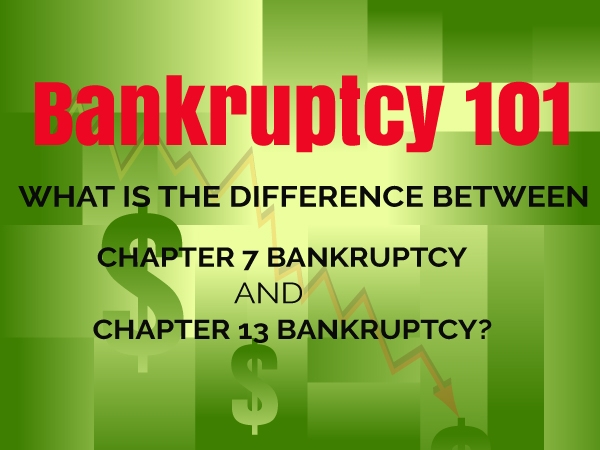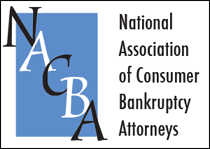
If you’re considering filing for bankruptcy, then you don’t need to be told what it’s like to really feel like you’re struggling financially. You start to dread hearing the phone ring, knowing that there could easily be an angry creditor or a bill collector on the other end. Paying bills and managing your money become stressful, depressing tasks that leave you worrying about the future more often than not.
However, while you know ling for bankruptcy will put an end to a lot of these issues, it’s only natural to also worry about whether or not it’s really the right choice for you. Then there are the many additional questions you probably have about the process. One of the most common concerns is in regards to the differences between a Chapter 7 bankruptcy and a Chapter 13 bankruptcy.
Is there really a significant difference between the two? How do you know which one is right for you, your family, and your unique financial situation? What are the advantages and disadvantages of each? What is the best way to start the process of ling for either one? Here we’ll address the answers to all of these questions and more.
What Bankruptcy Can (and Can’t) Do for You
The right to declare bankruptcy if you need to is granted to you by the United States Constitution. It’s there to allow businesses and individuals alike the chance to start fresh if they’re ever unable to pay o their existing debts or otherwise find a resolution to financial difficulty. From there, the business or individual in question can begin to rebuild their credit and take steps toward a better, bright future
However, it’s important to understand that bankruptcy is not a quick x. Whether or not it’s the solution you’re looking for will depend largely on your unique situation. Here’s a closer look at the pros and cons.
Advantages of Bankruptcy
Once you’ve led bankruptcy, an automatic stay is triggered. This prevents your creditors from continuing to contact you in an attempt to collect on their debts. The stressful phone calls and letters will stop. They will no longer be able to sue you over your debts or threaten to do so. You may also be able to completely eliminate your obligation to repay your dischargeable debts by ling for bankruptcy.
In many cases, a bankruptcy gives people the relief they need to begin rebuilding their credit and getting their financial lives back on track. By properly leveraging bankruptcy exemptions, many debtors can even make it through the process without losing their property—a major fear for many people.
Disadvantages of Bankruptcy
One of the most commonly known disadvantages of ling for bankruptcy is that it stays on your credit report for a long time—between 7 and 10 years. Naturally, this makes it hard to qualify for loans or mortgages during that span of time.
Existing creditors may elect to cancel your credit cards once you file. You may be denied tax refunds from the government because you’ve led for bankruptcy. In the event you’re unable to obtain bankruptcy exemptions for your personal property, there’s a chance it could be seized and sold by the court to facilitate repayment to your creditors.
It’s also important to realize that bankruptcy can only dissolve certain kinds of debts. Nondischargeable debts may well include student loans, child support orders, alimony, liens, or tax debts.
Whether or not ling for bankruptcy is really a good t for you will depend largely on the types of debts you’re seeking relief from. A good bankruptcy lawyer can discuss your options with you and help you better determine what your next move should be.
What Is Chapter 7 Bankruptcy?
A Chapter 7 bankruptcy is what’s known as a liquidation bankruptcy. It’s designed to completely wipe out unsecured debt associated with medical bills, credit cards, and so forth. However, you need to have little to no disposable income in order to qualify. If it’s determined that you make too much money, you may need to file for a Chapter 13 bankruptcy instead.
When you file for a Chapter 7 bankruptcy, your case is assigned to a trustee that will be in charge of reviewing your case, as well as any supporting documents and paperwork. The trustee will also be in charge of seizing and selling any nonexempt property you may have in order to pay your creditors. In the event you don’t own any nonexempt property, then your creditors will not be repaid.
All things considered, Chapter 7 bankruptcy is a better t for people with low or limited incomes and very few assets—people who are looking to get rid of unsecured debt in an attempt to make a fresh financial start.
- Both individuals and businesses can qualify for Chapter 7 bankruptcy.
- It typically takes between 3 and 5 months to receive a discharge.
- As touched on above, the appointed trustee can seize and sell any nonexempt property.
- Chapter 7 bankruptcy does not provide a way for debtors to catch up on any missed payments in order to avoid repossession or foreclosure.
What Is Chapter 13 Bankruptcy?
A Chapter 13 bankruptcy is what is known as a reorganization bankruptcy. It’s best suited to debtors who have a regular income and who are in a position to repay at least a portion of their debt. (This is usually accomplished through a repayment plan of one kind or another.) Many people who don’t qualify for a Chapter 7 bankruptcy will choose to go with a Chapter 13 instead.
However, there are those who decide they’d prefer to file for a Chapter 13 anyway, and it’s not hard to see why.
Chapter 13 bankruptcy comes along with many benefits that you won’t get with a Chapter 7. For instance, the debtor is able to retain ownership of all of their property, including nonexempt property. The repayment plan set in place will be determined by several factors, including your income, the types of debt that you owe, and your monthly expenses.
Before making the decision to file for a Chapter 13 bankruptcy—especially if you qualify for a Chapter 7—make sure that you’re willing and able to repay all or most of your debts eventually. Chapter 13 is at for those with many assets to protect, as well as a reliable means of regular income.
- Only individuals can qualify for Chapter 13 bankruptcy. (Sole proprietors do qualify.)
- There are limits on how much unsecured and secured debt you can have in order to qualify. These limits may vary from state to state.
- Discharges are received upon completion of all payments according to your plan. (Typical repayment time frames are between 3 and 5 years.)
- Chapter 13 allows for the removal of unsecured junior liens through lien stripping.
- Chapter 13 reduces the principal loan balance on secured debt via loan cramdown.
- Chapter 13 does allow debtors to catch up on missed payments in relation to mortgages, automobiles, and non-discharged debt.
- You may wind up having to pay back at least a portion of general unsecured debt.
What You Need to Know About
Chapter 7 Bankruptcy versus Chapter 13 Bankruptcy
Once a debtor finds out that a Chapter 13 bankruptcy eliminates the possibility of losing their property as part of the process, they may be tempted to go that route even if they qualify for a Chapter 7. However, it’s important to understand the realities of each process before you make a final decision
Time Frame
The average Chapter 7 bankruptcy case is opened and closed within 3-6 months, a relatively short time after which you can potentially emerge debt-free. Dischargeable debts commonly include all of the following:
- Medical bills
- Money owed to collection agencies
- Credit card charges
- Utility bills
- Business debts
- Civil court judgments (unless based on fraud)
- Attorney fees
- Auto accident claims
You will still be responsible for repaying nondischargeable debt, including but not necessarily limited to the following:
- Taxes owed
- Child or spousal support debt
- Most student loans
- Court fines and penalties
- Any fines or penalties owed to government agencies
Property
Yes, it’s possible to lose some of your property when you file for Chapter 7 bankruptcy. However, it’s important to note that the great majority of those who file do not. This is especially the case if you have very little property to your name to begin with. Bankruptcy as a process allows people to keep most of their necessities, so long as they haven’t been pledged as collateral to obtain a loan.
Going Debt-Free
A large number of debtors who file for Chapter 13 bankruptcy do not complete their repayment plans.Full repayment within 3-5 years must occur in order for the debts to be discharged, so those who file are taking a risk. Most people who file for Chapter 7 bankruptcy are able to walk away without having to pay any portion of their debts.
Chapter 13 may be a better option for those with a lot of nonexempt property that they want to make sure they keep. It’s also a good option if you have co-debtors who will remain on the hook for money owed once your portion of the debt is discharged. However, creditors will leave co-debtors alone so long as the person ling for Chapter 13 keeps up with their bankruptcy repayments according to the designated plan.
Do You Need a Bankruptcy Lawyer?
Bankruptcy law does not require a debtor to have a bankruptcy lawyer in order to file. You are absolutely allowed to represent yourself in regards to both Chapter 7 and Chapter 13 cases. However, this is not always a good idea, for a number of reasons.
You will need to perform all of your own research and be prepared to devote a lot of time to your own case. For instance, there will be many forms and schedules that need to be filled out. If you are ling for a Chapter 7 bankruptcy and want to make sure that all of your property is protected, you’ll need to thoroughly research the exemption laws in your state, as well as gain a proper understanding of how bankruptcy law works. You’ll need to be able to follow all of the rules and regulations to the letter, as the bankruptcy process doesn’t leave any room for error.
A bankruptcy lawyer can handle all of these things for you. They can help you make an informed decision about whether you should be ling for Chapter 7 or Chapter 13 bankruptcy. They’ll also be knowledgeable and experienced on a level you won’t be, unless you’re in bankruptcy law yourself. Sometimes having a good lawyer on your side can make all the difference in the ultimate outcome of your case. Knowing you have someone on your side can help you deal with the stress and emotional toll of the process.
Getting the Process Started
The first time you meet with your bankruptcy attorney, you’ll mostly be providing him or her with vital information as to your financial situation. That said, you’ll want to come prepared with the following items.
- Pay stubs and/or receipts detailing money received over the last six months.
- Your last two federal and state tax returns, including 1099 and W2 forms.
- All of your outstanding bills detailing what you owe and to whom.
- A recent copy of your credit report.
- Any and all documents detailing debts, like child support, court ordered alimony, vehicle titles,and unemployment information.
If you’re not sure that you can afford the services of an attorney, don’t simply decide that you have no choice but to undergo the process of ling alone. Ask about payment options. Many top bankruptcy attorneys understand that if you’re truly and honestly broke because of wage garnishments, frozen accounts, and other similar circumstances, you may need to work something out.
Choose an attorney that you feel comfortable with, and who has an excellent track record for success with cases like yours. While it’s understandable that debt and the possibility of ling for bankruptcy will be stressful, sanity is just around the corner, and the right bankruptcy attorney can be a big help. Explore the possibilities today!


